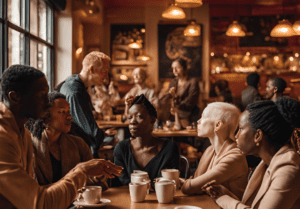Introduction:
The question Can an albino black person say the n-word? is not simply about language; it is tied deeply to identity, race, and cultural belonging. Albino black people are a unique group that navigates complex societal landscapes where they are both insiders and outsiders in different ways. From health struggles due to their lack of melanin to social marginalization, their experiences shape their relationship with race in profound ways. Similarly, for an albino black person girl, the intersection of race, gender, and albinism presents unique challenges and opportunities that shape their identity, self-expression, and place in society.
In this article, we explore these intersections and delve into the nuances of what it means to be an albino black person and how gender and cultural identity influence their experiences. We also answer the pressing question: Can an albino black person say the n-word? This article is designed to shed light on the lived experiences of albino black individuals, particularly the girls, and how they manage their dual identity within a world that often defines people by appearance.
What Is an Albino Black Person? Understanding the Genetic Condition and Its Impact
An albino black person is an individual of African descent who is affected by albinism—a genetic condition that results in little or no pigmentation in the skin, hair, and eyes. Unlike individuals with more common skin tones, albino black people have lighter skin, often appearing pale or white, and their hair may be blonde, white, or light brown. Their eyes might also be lighter, ranging from blue to gray or even reddish hues.
Here you can also learn more about Genetic conditions of Albino Black Persons
Despite their physical differences, albino black people are African or African American. The challenge lies in how they are perceived by others. They may face prejudice or discrimination both within their racial community and from outside groups. In many ways, their identity is shaped by how others see them, but their genetic and cultural roots remain deeply tied to Africa and the African diaspora.
This distinction is essential because it helps answer the larger questions about what it means to be an albino black person and how their experiences differ from others. For instance, can an albino black person say the n-word? The question comes up because the term, historically used as a racial slur, has been repurposed within the African American community as a term of solidarity and familiarity. However, for an albino black person, whose outward appearance is drastically different from that of other African Americans, the answer is not straightforward.

Can an Albino Black Person Say the N-Word?
The question Can an albino black person say the n-word? taps into the complexities of race, culture, and self-perception. On one hand, the n-word is a powerful term used within African American communities as a sign of familiarity, camaraderie, and cultural resilience. But for an albino black person, the situation can feel complicated due to their appearance. With skin tones significantly lighter than other black individuals, many albino black people are often viewed as “other,” sometimes even by members of their own racial community.
While the n-word historically symbolized racial oppression, in modern times, many African Americans have reclaimed it, using it as a term of endearment or solidarity. However, there is a longstanding debate about who can use the term, with some arguing that the use of the n-word should be reserved for individuals who visibly fit the social and cultural mold of blackness. For an albino black person, this presents a dilemma. While their racial heritage and genetic makeup connect them to the African American community, their physical appearance might cause them to feel like outsiders.
Some albino black people may feel hesitant or excluded from using the n-word because of how they are perceived. However, it is important to remember that albino black people are still part of the cultural and historical fabric of black identity, even if they do not fit the visual mold of traditional blackness. The use of the n-word should be a personal choice, guided by individual experience, connection to the community, and understanding of its complex history.
The Unique Experiences of an Albino Black Person Girl
For an , the intersection of race, gender, and albinism creates unique challenges. In many societies, beauty standards are heavily influenced by skin tone, with darker skin often being idealized, especially within the African American community. This can create feelings of exclusion for albino black person girls, whose pale skin makes them stand out.
An albino black person girl might struggle with self-esteem, particularly during adolescence when beauty norms are most rigidly enforced. The pressure to conform to traditional beauty ideals can be overwhelming, especially when a young woman is already navigating the complexities of being a minority in her own community.
However, in recent years, there has been a growing movement toward inclusivity and acceptance of diverse beauty standards. Models like Diandra Forrest and Shaun Ross, who have albinism, are pushing back against traditional notions of beauty. They are not just breaking boundaries in the fashion industry but also helping albino black person girls everywhere embrace their uniqueness and redefine beauty.
The rise of albino black role models in the media is shifting the narrative about what is considered beautiful, offering albino black person girls the chance to feel empowered in their own skin. Instead of viewing their appearance as a disadvantage, many albino black girls are now celebrating their distinctiveness as a powerful form of self-expression.
The Struggles of Full Integration for Albino Black People
An albino black person often faces difficulties when trying to fully integrate into mainstream society. While society has made strides toward embracing diversity, individuals who do not conform to the expected physical norms can still face exclusion. Albino black people, with their starkly contrasting features compared to both other black individuals and non-black people, often find themselves caught in an in-between space.
This struggle for integration is compounded by the fact that albino black people face several health challenges. The lack of melanin makes them more prone to sunburns, skin cancer, and other dermatological issues. Additionally, albino black people are more likely to experience eye problems, such as light sensitivity (photophobia) and impaired vision, which makes simple daily tasks more difficult.
Despite these challenges, albino black individuals are determined to succeed and make meaningful contributions to society. From the fashion industry to the entertainment world, albino black people are creating space for themselves, breaking stereotypes, and redefining what it means to be black.
Debunking Common Myths About Albino Black People
There are numerous myths and misconceptions surrounding albino black people that can perpetuate discrimination and misunderstanding. A common myth is that albinism somehow disconnects an individual from their African roots or culture. In reality, albinism is a genetic condition, not a loss of identity. An albino black person is still connected to their African heritage, regardless of their appearance.
Read about the Myths of Albino Black People
Another myth is that albino black people are isolated from the black community. While their unique appearance may cause them to feel marginalized at times, many albino black people are deeply involved in their cultural communities, participating in family traditions and social activities. Albinism may alter their outward appearance, but it does not alter the core of their identity. Educating the public about the true nature of albinism can help dispel these myths and foster a more inclusive society where people of all appearances feel welcome.
The Power of Media Representation for Albino Black People
Media representation plays a crucial role in shaping how albino black people are perceived by society. Historically, the media has portrayed individuals with albinism in a negative or sensationalized light, often focusing on their differences rather than their humanity. However, as more albino black people gain visibility in media, from fashion to film, there is hope that the stereotypes surrounding albinism will fade.
You may also want to know about famous Albino Black personalities
Social media platforms, in particular, have allowed albino black people to share their stories and experiences with a global audience. This increased visibility is changing how society views people with albinism, especially albino black person girls, who are now able to see themselves represented in empowering ways. The growing media presence of albino black people is helping to break down harmful stereotypes and shift cultural norms about beauty and race.
Conclusion:
The journey of an albino black person is a complex and multifaceted one. Whether it’s grappling with questions like can an albino black person say the n-word?, navigating the challenges of being an albino black person girl, or trying to integrate into mainstream society, these individuals face unique struggles. However, they also embody resilience, strength, and a profound sense of cultural identity. As visibility and understanding increase, society can begin to embrace the full spectrum of black experiences, moving toward a more inclusive and compassionate future.
By understanding the intersection of race, gender, and albinism, we can better appreciate the unique experiences of albino black people and support their right to exist and thrive within their communities.



